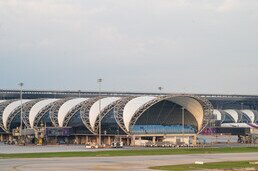
Western Sydney International Will Get Passengers Moving Faster
- 20 Sep 2021
Cutting-edge technology and innovative design will come together on the airfield at Western Sydney International (Nancy-Bird Walton) Airport to set a new benchmark for air travel in Australia.
Construction of the 3.7-kilometre runway and rapid-exit taxiways will begin in 2022 after the contract to design and build the airfield at Sydney’s new airport was awarded to the CPB Contractors and ACCIONA joint venture following a competitive procurement process.
Western Sydney Airport CEO Simon Hickey said the efficient airfield design, enabled by the latest technology, will reduce taxi times, preventing delays on the tarmac that can be frustrating for passengers and costly for airlines.
“Our airfield’s design means we’ll safely get planes in the air or to the gates faster,” Mr Hickey said.
“At Western Sydney International, we’ll get passengers on their way sooner, whether that’s getting to your meeting on time or arriving home to loved ones.
“Passengers and airlines will love using Western Sydney International because the experience we deliver will be seamless, safe and reliable from start to finish.”
WSI’s runway will handle the full range of commercial aircraft, including the new generation of ultra-long-haul airliners like the A350-1000 and Boeing 777X. WSI will be the only airport in Sydney equipped with a modern CAT III-B instrument landing system.
”Western Sydney International will continue operating safely in foggy conditions that currently shut down Sydney’s skies,” Mr Hickey said.
“Our airfield will be future-ready, designed for expansion with consideration for emerging technologies such as electric aircraft.”
Sustainability will remain a key focus on the airfield as well as in the terminal, with the efficient design reducing fuel burn and emissions. Lighting will be LED with recycled content used where appropriate for construction.
Crushed sandstone from tunnelling projects across Sydney will be reused as a high-strength foundation to support construction of the runway, taxiways and roads. Along with the runway and taxiways, airfield construction will include more than 40 kilometres of roads and the installation of 3000 aeronautical ground lights. It also includes 90 kilometres of power and fibre optic cabling to electrify the airport and enable the delivery of tomorrow’s technology to what will be Australia’s new gateway to the world.
Airfield construction is expected to create around 1,200 direct jobs and support many more indirect jobs through flow-on benefits to suppliers, subcontractors and the local economy.
Western Sydney International is on track to open to international, domestic and air cargo services in late 2026.
Contact:
Belinda Merhab
Email: bmerhab@asaco.com.au
- CATEGORY
- COUNTRY / AREA
- Australia













